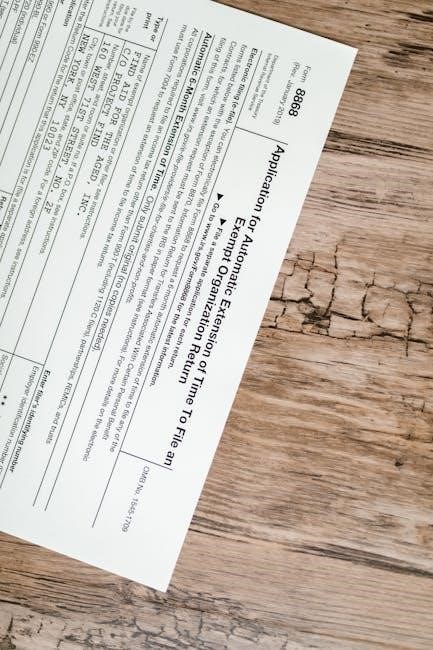
petition for summary administration florida form pdf
Get the Florida Probate Form PDF for summary administration. Free download, fillable, and easy to use for estate planning.
1.1 What is Summary Administration?
1.2 Importance of the Petition for Summary Administration

The Petition for Summary Administration is a legal cornerstone for initiating the probate process in Florida. It formally requests the court to recognize the estate’s validity and grant authority for distribution. This document is essential for avoiding delays, ensuring compliance with probate laws, and protecting the rights of beneficiaries. Its accuracy and completion are critical for a smooth administration process.

Overview of the Petition for Summary Administration Process
The Petition for Summary Administration process in Florida is an efficient, streamlined method for managing smaller estates, offering a court-supervised alternative to full probate proceedings and resulting in an order for estate distribution.
2.1 Steps to File a Petition for Summary Administration
To file a Petition for Summary Administration in Florida, prepare the petition form, include the decedent’s will or an affidavit if intestate, and attach required documents. File the petition in the appropriate probate court, pay the filing fee, and serve notice to all interested parties. Attend a hearing if scheduled, then obtain the court’s order to proceed with estate distribution.
2.2 Key Documents Required
Key documents include the Petition for Summary Administration form, the decedent’s will (if applicable), an affidavit if the decedent died intestate, a certified death certificate, and a notice of administration. Additional requirements may include an oath of witness and a completed checklist to ensure all criteria for summary administration are satisfied.
Eligibility Criteria for Summary Administration
Eligibility for summary administration in Florida requires the estate to meet specific criteria, such as the value of the estate, the time since the decedent’s passing, and the presence of a valid will or intestate status. These criteria ensure the process is only used for simpler cases.
3.1 Who Can File a Petition for Summary Administration?
The petitioner for summary administration in Florida must be a beneficiary, heir, or the personal representative named in the decedent’s will. They must legally file the petition, typically in the county where the decedent resided, and meet specific eligibility criteria to ensure the process is handled properly and fairly for all parties involved.
3.2 Estate Value and Time Limitations
Required Forms and Documents
The process requires specific forms like the Petition for Summary Administration, Order of Summary Administration, and Notice of Summary Administration. An affidavit and oath may also be necessary for verification purposes.

4.1 Petition for Summary Administration Form (PDF)
The Petition for Summary Administration is a legal document used to initiate the streamlined probate process. It includes details about the decedent, beneficiaries, and assets. The form must be completed accurately and filed with the court. It is available for download on Florida’s judicial circuit websites and can be exported to cloud storage for easy access and submission.
4.2 Order of Summary Administration Form
The Order of Summary Administration is a court-issued document that grants authority to distribute the estate according to the petition. It is typically included in the same packet as the Petition for Summary Administration form. Once approved, the order allows the petitioner to manage and distribute assets without formal probate. The form is available on Florida’s judicial circuit websites for download or printing.
4.3 Notice of Summary Administration

The Notice of Summary Administration is required to inform beneficiaries of the estate about the proceedings. It includes the decedent’s name, case number, and a summary of assets. The notice must be published in a local newspaper and served to all interested parties, ensuring transparency and compliance with Florida probate rules. It is typically included in the petition packet for filing.
4.4 Affidavit and Oath Requirements
An affidavit and oath are required for the Petition for Summary Administration. The affidavit must be executed before a court clerk, judge, or commissioner, confirming the truthfulness of the statements. If the will is not self-proved, a witness affidavit is needed. These requirements ensure the petition’s accuracy and compliance with Florida probate laws, safeguarding the estate administration process. Proper signatures and acknowledgments are mandatory.

Filing the Petition
Filing the Petition for Summary Administration initiates the legal process for estate administration in Florida. It involves submitting the completed form to the appropriate probate court with required fees and documentation, ensuring compliance with Florida’s legal procedures for estate settlement.
5.1 Where to File the Petition
The Petition for Summary Administration must be filed in the circuit court of the county where the decedent resided at the time of death or where their property is located. In Florida, this is typically the probate court within the appropriate judicial circuit. The petitioner must ensure the correct venue is chosen to avoid delays or dismissal of the petition.
5.2 Filing Fees and Costs
Filing fees for a Petition for Summary Administration vary by county and court. Costs typically include a base filing fee, additional fees for summonses or publications, and potential charges for document preparation or legal assistance. The total cost depends on the estate’s complexity and the court’s requirements. Contact the specific probate court for exact fee details before submission.

The Role of the Petitioner
6.1 Who Can Be a Petitioner?
6.2 Responsibilities of the Petitioner
The petitioner must accurately complete and file the Petition for Summary Administration with the appropriate probate court, ensuring all legal requirements are met. They must provide truthful information, attach necessary documents, and comply with Chapter 733, Florida Statutes. The petitioner is also responsible for notifying all interested parties and ensuring the estate is administered according to the law, avoiding any conflicts of interest or misconduct that could delay the process.
Legal Requirements and Statements
The Petition for Summary Administration must include the decedent’s name, case number, and a statement that the estate qualifies under Chapter 733, Florida Statutes. It must also indicate whether the decedent had a will and if administration is required, ensuring all legal criteria are met for summary administration.
7.1 Necessary Statements in the Petition
The Petition for Summary Administration must include the petitioner’s interest in the estate, the decedent’s name, and the estate’s value. It must state whether a will exists and if administration is required. The petition must also list the decedent’s surviving spouse, beneficiaries, and heirs, ensuring all legal criteria for summary administration are clearly met under Florida law.
7.2 Witness Affidavits and Signatures
The Petition for Summary Administration requires witness affidavits and original signatures. The petitioner must sign under oath, and if the will is not self-proved, an Oath of Witness must be executed before a Florida Circuit Judge or Clerk. Proper authentication ensures the petition’s validity, and the petitioner must authorize the court to send notices and orders to all parties involved.

Benefits and Drawbacks of Summary Administration
8.1 Advantages of Summary Administration
8.2 Potential Disadvantages
Common Mistakes to Avoid
Common mistakes include errors in completing the Petition for Summary Administration form, omissions in required documentation, and failure to properly notify all beneficiaries, which can delay or invalidate the process.
9.1 Errors in Completing the Form
Common errors include incorrect legal descriptions, missing signatures, and failure to attach required documents like the will or affidavit. Ensure all fields are accurately filled, as mistakes can delay or invalidate the petition. Consulting an attorney can help avoid such issues and ensure compliance with Florida probate rules and procedures.
9.2 Omissions in Required Documentation
Omissions in required documentation, such as failing to attach the will, affidavit, or notice, can lead to delays or dismissal of the petition. Ensure all necessary forms, including the Petition for Summary Administration and Order of Summary Administration, are completed and submitted. Missing or incomplete documents can complicate the process and require additional legal steps to resolve.
Timeline and Expected Outcomes
The Petition for Summary Administration typically results in a faster resolution compared to formal probate, often within a few weeks to months. The process is designed to expedite estate distribution when specific conditions are met, such as a valid will or agreement among beneficiaries.
Once the petition is approved, the estate assets are distributed according to the will or state law, and the estate is closed without further court proceedings; This streamlined process ensures efficiency and minimizes legal complications for the petitioner and beneficiaries.
10.1 How Long Does Summary Administration Take?
The Petition for Summary Administration process typically takes a few weeks to a few months, depending on the complexity of the estate and court efficiency. Once the petition is filed and approved, the estate is distributed swiftly, often without the need for prolonged legal proceedings. This expedited process ensures a timely resolution for beneficiaries.
10.2 What Happens After Filing the Petition?
After filing the Petition for Summary Administration, the court reviews the documents. If approved, the judge signs the Order of Summary Administration, allowing asset distribution. The estate is then settled according to the will or Florida intestacy laws, and the process is completed without further court proceedings, ensuring a smooth transfer of assets to beneficiaries.

Importance of Legal Consultation
Consulting an attorney ensures proper guidance through Florida’s probate laws, helping to avoid errors and disputes. Legal expertise simplifies the process and protects the interests of all parties involved.
11.1 When to Consult an Attorney
Consult an attorney when dealing with complex estates, disputes among beneficiaries, or unclear legal requirements. Legal guidance is essential for ensuring accuracy in completing the Petition for Summary Administration and Order of Summary Administration, avoiding errors, and navigating Florida’s probate laws effectively to prevent delays or legal challenges.
11.2 Legal Assistance in Completing Forms
Legal assistance is crucial for accurately completing the Petition for Summary Administration and related forms. An attorney ensures compliance with Florida probate laws, helps avoid errors, and streamlines the process. While forms are available online, professional guidance is recommended to prevent omissions and ensure proper execution, especially for complex estates or contested cases.

The Petition for Summary Administration in Florida offers a streamlined probate process for eligible estates, ensuring efficient distribution of assets with proper legal compliance and guidance.
12.1 Final Thoughts on Summary Administration
12.2 Next Steps After Filing the Petition
After filing the Petition for Summary Administration, the court will review the documents. If approved, an Order of Summary Administration is granted, allowing asset distribution. Beneficiaries and heirs are notified, and the estate is settled according to the will or state law. Legal assistance may be needed to ensure compliance with Florida’s probate requirements and avoid delays.